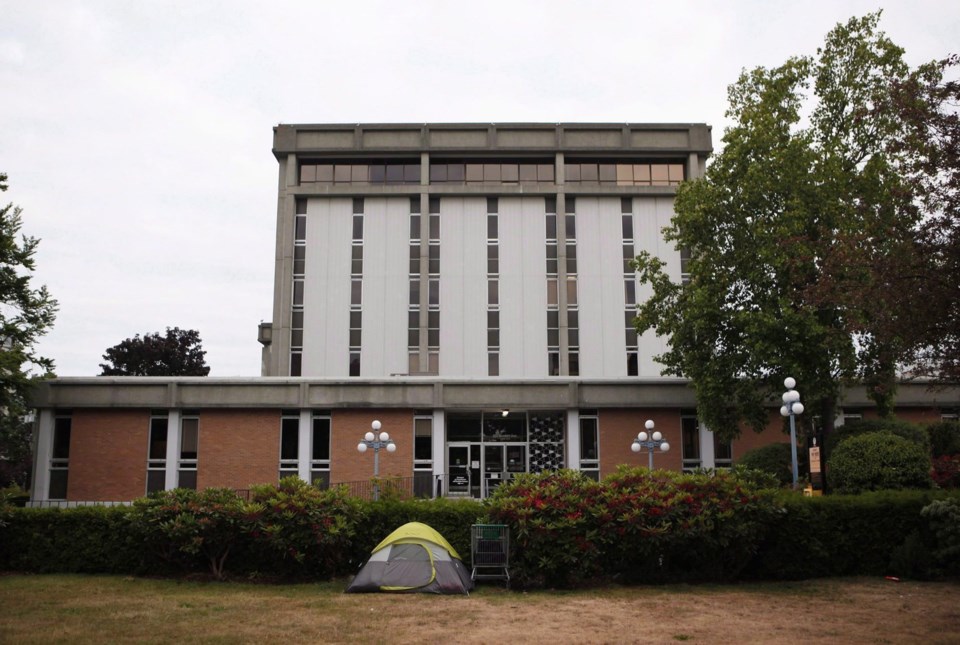The Chief of the Songhees Nation on Vancouver Island says a group of mobile home park residents on the Nation's reserve are continuing to resist being evicted after losing a court challenge, while the Nation's members live in "unsafe housing, unable to access their own lands."
Chief Ron Sam says most the Nation's members can't live on the reserve due to lack of housing, and the Songhees Nation's government gave residents of the mobile home park three years notice to relocate "to make way for urgently needed community housing."
The Chief says some residents challenged the eviction in court, and lost the case last month.
The court ruling posted Tuesday says residents of E. George Estates Manufactured Home Park have lived there for decades, believing they'd have a "long-term or perpetual interest" in the lands even though they didn't own the properties.
A lawyer for the tenants says his clients are "absolutely crushed" after losing a lawsuit challenging their evictions.
The park was established in the 1970s and the Songhees Nation took control of it in 2019, then moved two years later to end tenancies of the plaintiffs who are not members of the nation.
The ruling says the reserve is overcrowded and the Nation wants to develop the lands for "much-needed housing for its members," telling plaintiffs in June 2021 that they'd have to move out in three years.
Justice Veronica Jackson said the court has "a great deal of sympathy" for the plaintiffs, many of them elderly with health problems, but mobile home park tenants anywhere face the prospect of lease terminations, and three years' notice was "more than reasonable."
Lawyer Michael Drouillard, representing more than two dozen plaintiffs, said his clients are "overwhelmed" at the prospect of having to leave, and have been given until Aug. 15 to vacate under threat of having their utilities turned off.
Drouillard said he has filed an appeal of the ruling, which he said the court delayed releasing publicly for a month "to respect the privacy of the plaintiffs during a period of transition."
He said the decision was "absolutely crushing" to the plaintiffs.
"Most of them, their finances are now wiped out because they paid a lot of money for these homes that they now have to move and which are actually not really capable of being moved as a practical matter because of the costs and logistics involved," he said.
He said one of the plaintiffs had a stroke and is no longer able to take care of himself, and others lack a support network to help them figure out what to do now that they've lost the case.
"It's very overwhelming for these folks," he said.
The ruling says many of the tenant plaintiffs were under the mistaken impression the mobile home park lands were covered by a 99-year lease, but instead were month-to-month tenants.
It says some thought that if they paid their rent and taxes and followed park rules "they could stay forever."
The judge said the situation facing the tenants has been a source of "tremendous personal hardship and financial distress."
"However, the situation is not of the Songhees Nation’s making," Jackson ruled. "None of the plaintiffs were ever entitled to a long-term interest in their sites."
Drouillard said he worries that some tenants are at "immediate risk of homelessness" if they're forced to leave by the deadline set out in a letter sent by the Songhees Nation on July 15.
"The reason why I'm saying they're at heightened risk for homelessness is because this eviction has both required them to leave, but it's also annihilated their life savings," he said.
Chief Sam said in a statement that most of the reserve's residents are not members of the Songhees Nation.
"Even after the Nation succeeded on every point in court, some residents are still trying to fight us and prevent us from using our lands to help our members in need," he said. "We cannot move forward with our housing plans until we know the state of the land and any remediation requirements — things that can’t happen until the park residents leave."
"Meanwhile, our members remain in unsafe housing, unable to access their own lands."
The ruling says the park was established in the 1970s and operated by a company owned by a nation member who later died, before the Nation took it over.
This report by The Canadian Press was first published July 23, 2025.
Darryl Greer, The Canadian Press



